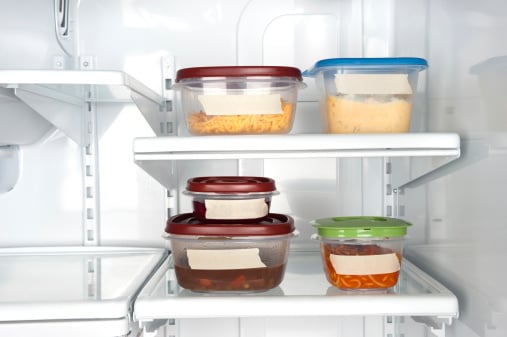Food Storage

Do you cringe when you open the door to the fridge and smell leftover odors? Or do you come home from work just to find your husband or wife eating something out of the fridge from 2 weeks ago? My mom always told me the rule for leftovers in the fridge was a week…anything longer should be tossed. But, I’ve seen this rule tested by husbands eating food that was 2 weeks old and not getting sick. So it made me start to wonder what really is best when it comes to food storage.
Turns out there are many different rules, depending on the food and where they are stored. Here’s a great chart to help guide you when storing your food.
|
Product |
Refrigerator (40F) |
Freezer (0F) |
|
|
Deli |
|||
|
Entrees, cold or hot |
3 to 4 days |
1 to 2 months |
|
|
Store-sliced lunch meats |
3-5 days |
1-2 months |
|
|
Salads |
3 to 5 days |
Do not freeze |
|
|
Hot dogs & Luncheon Meats |
|||
|
Hot dogs, |
1 week |
1 to 2 months |
|
|
unopened package |
2 weeks |
1 to 2 months |
|
|
Luncheon meats, opened package |
3 to 5 days |
1 to 2 months |
|
|
unopened package |
2 weeks |
1 to 2 months |
|
|
Bacon & Sausage |
|||
|
Bacon |
7 days |
1 month |
|
|
Sausage, raw from chicken, turkey, pork, beef |
1 to 2 days |
1 to 2 months |
|
|
Smoked breakfast links, patties |
7 days |
1 to 2 months |
|
|
Hard sausage – pepperoni, jerky sticks |
2 to 3 weeks |
1 to 2 months |
|
|
Summer sausage – labeled "Keep Refrigerated"opened |
3 weeks |
1 to 2 months |
|
|
Unopened |
3 months |
1 to 2 months |
|
|
Ham, Corned Beef |
|||
|
Corned beef, in pouch with pickling juices |
5 to 7 days |
Drained, 1 month |
|
|
Ham, fully cooked vacuum sealed at plant, undated, unopened |
2 weeks |
1 to 2 months |
|
|
Ham, fully cooked vacuum sealed at plant, dated, unopened |
"use by" date on package |
1 to 2 months |
|
|
Ham, fully cooked, whole |
7 days |
1 to 2 months |
|
|
Ham, fully cooked, half |
3 to 5 days |
1 to 2 months |
|
|
Ham, fully cooked, slices |
3 to 4 days |
1 to 2 months |
|
|
Hamburger, Ground & Stew Meat |
|||
|
Hamburger & stew meat |
1 to 2 days |
3 to 4 months |
|
|
Ground turkey, veal, pork, lamb & mixtures of them |
1 to 2 days |
3 to 4 months |
|
|
Fresh Beef, Veal, Lamb, Pork |
|||
|
Steaks |
3 to 5 days |
6 to 12 months |
|
|
Chops |
3 to 5 days |
4 to 6 months |
|
|
Roasts |
3 to 5 days |
4 to 12 months |
|
|
Variety meats – tongue, liver, heart, kidneys, chitterlings |
1 to 2 days |
3 to 4 months |
|
|
Pre-stuffed, uncooked pork chops, lamb chops, or chicken breast stuffed with dressing |
1 day |
Do not freeze |
|
|
Soup & Stews |
|||
|
Vegetable or meat added |
3 to 4 days |
2 to 3 months |
|
|
Meat Leftovers |
|||
|
Cooked meat and meat casseroles |
3 to 4 days |
2 to 3 months |
|
|
Gravy and meat broth |
1 to 2 days |
2 to 3 months |
|
|
Fresh Poultry |
|||
|
Chicken or turkey, whole |
1 to 2 days |
1 year |
|
|
Chicken or turkey, pieces |
1 to 2 days |
9 months |
|
|
Giblets |
1 to 2 days |
3 to 4 months |
|
|
Cooked Poultry |
|||
|
Fried chicken |
3 to 4 days |
4 months |
|
|
Cooked poultry casseroles |
3 to 4 days |
4 to 6 months |
|
|
Pieces, plain |
3 to 4 days |
4 months |
|
|
Pieces covered with broth, gravy |
1 to 2 days |
6 months |
|
|
Chicken nuggets, patties |
1 to 2 days |
1 to 3 months |
|
|
Pizza |
|||
|
Pizza |
3 to 4 days |
1 to 2 months |
|
|
Stuffing |
|||
|
Stuffing – cooked |
3 to 4 days |
1 month |
|
|
Beverages, Fruit |
|||
|
Juices in cartons, fruit drinks, punch |
3 weeks unopened, |
8 to 12 months |
|
|
Dairy |
|||
|
Butter |
1 to 3 months |
6 to 9 months |
|
|
Buttermilk |
7 to 14 days |
3 months |
|
|
Cheese, Hard (such as Cheddar, Swiss) |
6 months, unopened |
6 months |
|
|
Cheese Soft (such as Brie) |
1 week |
6 months |
|
|
Cottage Cheese, Ricotta |
1 week |
Do not freeze |
|
|
Cream Cheese |
2 weeks |
Do not freeze |
|
|
Cream – Whipped, ultrapasteurized |
1 month |
Do not freeze |
|
|
Whipped, Sweetened |
1 day |
1 to 2 months |
|
|
Aerosol can, real whipped cream |
3 to 4 weeks |
Do not freeze |
|
|
Aerosol can, non-dairy topping |
3 months |
Do not freeze |
|
|
Cream, Half and Half |
3 to 4 days |
4 months |
|
|
Eggs, in shell |
3 to 5 weeks |
Do not freeze |
|
|
Raw yolks, whites |
2 to 4 days |
1 year |
|
|
Hard cooked |
1 week |
Do not freeze |
|
|
Egg substitutes, liquid |
|
|
|
|
opened |
3 days |
Do not freeze |
|
|
unopened |
10 days |
1 year |
|
|
Eggnog, commercial |
3 to 5 days |
6 months |
|
|
Margarine |
4 to 5 months |
12 months |
|
|
Milk |
7 days |
3 months |
|
|
Pudding |
package date; 2 days after opening |
Don't freeze |
|
|
Sour cream |
7 to 21 days |
Don't freeze |
|
|
Yogurt |
7 to 14 days |
1 to 2 months |
|
|
Dough |
|||
|
Tube cans of rolls, biscuits, pizza dough, etc. |
"use by" date on package |
Don't freeze |
|
|
Ready-to-bake pie crust |
"use by" date on package |
2 months |
|
|
Cookie dough |
"use by" date on package |
2 months |
|
|
Fish |
|||
|
Lean fish (cod, flounder, haddock, sole, etc.) |
1 to 2 days |
6 months |
|
|
Fatty fish (bluefish, mackerel, salmon, etc.) |
1 to 2 days |
2 to 3 months |
|
|
Cooked fish |
3 to 4 days |
4 to 6 months |
|
|
Smoked fish |
14 days or date on vacuum package |
2 months in vacuum package |
|
|
Shellfish |
|||
|
Shrimp, scallops, crayfish, squid, shucked clams, mussels and oysters |
1 to 2 days |
3 to 6 months |
|
|
Live clams, mussels, crab, lobster and oysters |
2 to 3 days |
2 to 3 months |
|
|
Cooked shellfish |
3 to 4 days |
3 months |
|
When following these rules, it is also important to note that you should be storing foods correctly.
- Store all leftovers in airtight, leak-proof containers or wraps. Refrigerate leftovers within two hours of cooking. Don’t worry, modern refrigerators can handle the heat of food being stored in them directly from cooking, so no need to let cool first.
- Keep fruits and vegetables separate from other foods in the fridge and store like with like: apples with apples, carrots with carrots. Fruits and vegetables give off different gases that can cause others to deteriorate. Store fruits and vegetables susceptible to drying out in perforated or unsealed plastic bags to maintain a moist environment yet still allow air to circulate. Also, don't wash produce before refrigerating it as the dampness can make it mold and rot more quickly.
- Store cottage cheese, yogurt, sour cream, milk, and cream in the containers they came in. If removed from original containers for serving, do not put them back into the containers they came in. Store in new clean air-tight containers.
- Store hard cheeses in the store wrapping until you use them, then wrap them in wax paper, foil, or loose plastic.
- Keep all fresh meat, fish, and poultry in its store wrapping. You may want to consider putting a plate under it if it came in a Styrofoam bottom wrapping to catch any juices that can sometimes leak.
- Don't refrigerate canned sauces or foods in the opened cans. Once a can is opened, residual metal on the rim can leach into food and leave a metallic taste.
- Don’t stuff your refrigerator too full. Cool air needs to circulate to keep food at a safe temperature.
